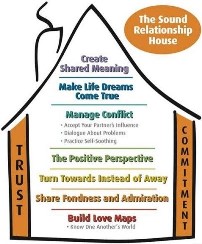ShuangYing Mediation, LLC
双赢调解事务所STAY OUT OF COURT
Marriage is not only a matter of emotion, but also an important event linked to each other's health and the child's physical and mental health. Seems to be a trivial matter by 69% of the disagreements arising from minor trivia in life, but it is such an annoyance that there is no solution to the problem and the disaster caused by these trivial matters
My work is based on the Gottman approach, which I combine with elements of Emotionally Focused couple thearpy and Neuro Linguistic programming Therapy. I will support you in finding balance in your life while helping you meet and get to know your authentic self. Our research shows that to make a relationship last, couples must become better friends, learn to manage conflict, and create ways to support each other’s hopes for the future. Drs. John and Julie Gottman have shown how couples can accomplish this by paying attention to what they call the Sound Relationship House, or the nine components of healthy relationships. I am one of the few couple therapists in the United States who speak Chinese and English and use the Gottman method.
I am happy to provide you with a free 30-minute telephone consultation. Please feel free to contact me with any questions or concerns. I am willing to discuss your needs in advance and provide you with more experience information.

Problems that can benefit from Gottman Method™ Couples Therapy
- Unresolved issues from past events and situations
- Lack or loss of friendship within the relationship
- Problems with sexual intimacy
- Very little to no romantic spark
- Differences in hopes, life goals, and aspirations
- Communication problems
- Emotional detachment
- Feelings of isolation or loneliness within the relationship
- Sexual or emotional infidelity
- Problems with jealousy
- Disagreements about parenting
- Blended family issues
- Trying to decide whether or not to stay together only for the children’s benefit
- Frequent bickering
- Difficulties agreeing on important issues
- Verbal abuse
- Dealing with the aftermath of trauma
- What to do when the relationship has become strictly platonic
- Unique issues related to being an LGBT couple
Benefits of GMCT
- Greater respect for each other
- More affection in the relationship
- The tools to maintain the progress made in therapy
- A deeper emotional connection and sense of closeness
- Deeper understanding of each other
- Ability to manage conflict in a calm manner
- Re-ignition of the romantic spark
- Stronger friendship between partners
- Ability to de-escalate intense conflict quickly
- Ability to work through times when they feel stuck or gridlocked in conflict
- Less criticism and defensiveness
- Healing from infidelity
- Healing from any type of betrayal
- Much less (if any) feelings of contempt
- Ability to communicate effectively when hurt, angry, or upset – no stonewalling
- Greater sense of appreciate for each other
Marriage is not only a matter of emotion, but also an important event linked to each other's health and the child's physical and mental health. Seems to be a trivial matter by 69% of the disagreements arising from minor trivia in life, but it is such an annoyance that there is no solution to the problem and the disaster caused by these trivial matters
My work is based on the Gottman approach, which I combine with elements of Emotionally Focused couple thearpy and Neuro Linguistic programming Therapy. I will support you in finding balance in your life while helping you meet and get to know your authentic self. Our research shows that to make a relationship last, couples must become better friends, learn to manage conflict, and create ways to support each other’s hopes for the future. Drs. John and Julie Gottman have shown how couples can accomplish this by paying attention to what they call the Sound Relationship House, or the nine components of healthy relationships. I am one of the few couple therapists in the United States who speak Chinese and English and use the Gottman method.
I am happy to provide you with a free 30-minute telephone consultation. Please feel free to contact me with any questions or concerns. I am willing to discuss your needs in advance and provide you with more experience information.

Problems that can benefit from Gottman Method™ Couples Therapy
- Unresolved issues from past events and situations
- Lack or loss of friendship within the relationship
- Problems with sexual intimacy
- Very little to no romantic spark
- Differences in hopes, life goals, and aspirations
- Communication problems
- Emotional detachment
- Feelings of isolation or loneliness within the relationship
- Sexual or emotional infidelity
- Problems with jealousy
- Disagreements about parenting
- Blended family issues
- Trying to decide whether or not to stay together only for the children’s benefit
- Frequent bickering
- Difficulties agreeing on important issues
- Verbal abuse
- Dealing with the aftermath of trauma
- What to do when the relationship has become strictly platonic
- Unique issues related to being an LGBT couple
Benefits of GMCT
- Greater respect for each other
- More affection in the relationship
- The tools to maintain the progress made in therapy
- A deeper emotional connection and sense of closeness
- Deeper understanding of each other
- Ability to manage conflict in a calm manner
- Re-ignition of the romantic spark
- Stronger friendship between partners
- Ability to de-escalate intense conflict quickly
- Ability to work through times when they feel stuck or gridlocked in conflict
- Less criticism and defensiveness
- Healing from infidelity
- Healing from any type of betrayal
- Much less (if any) feelings of contempt
- Ability to communicate effectively when hurt, angry, or upset – no stonewalling
- Greater sense of appreciate for each other
The Sound Relationship House
The sound relationship house is based on the 9 key aspects of healthy relationships. These are as follows:
- Love maps – Happy couples build “love maps” together. Love maps refer to the depth of knowledge each partner has regarding the other partner’s internal world. This includes the partner’s history (e.g. background, childhood, etc.), the things he or she worries about or fears, the stressors in the partner’s life, the things that give him or her joy, and his or her hopes and dreams regarding the future.
- Fondness and admiration for each other – One of the indicators of a happy, healthy, and strong relationship is that both partners truly like and admire each other – and they share those feelings readily and openly by being affectionate with, respectful towards, and appreciative of each other. This is the key to overcoming and eliminating any feelings of contempt or resentment that may festering – or even worse – that have already grown to a dangerous degree in one or both partners.
- Positive perspective – This priority element involves a positive approach to working through conflict and solving problems within the relationship. It also includes looking at whether or not attempts to fix problems within the relationship have been successful or not.
- Manage conflict – Disagreements and arguments are to be expected in any partnership; you simply can’t put two people together for long periods of time and expect them to get along 100% perfectly. That’s why it’s important to be able to manage conflict when it does occur, rather than allow the conflict to seriously damage or destroy the relationship. Conflict necessarily a bad thing – it provides a great opportunity to learn about the other person as well as yourself. Learning to effectively handle persistent or repetitive conflicts is crucial to a happy, lasting relationship.
- Turn Towards – In happy relationships, it’s often the small things and moments that truly make life worthwhile. In fact, it’s often the smallest things that enhance and reinforce the relationship. This component involves stating your needs (so your partner doesn’t have to guess), and paying attention to him or her by “turning towards” him or her daily. This element also involves states your needs calmly and clearly.
- Create shared meaning – This involves understanding the important myths, metaphors, visions, and narrative accounts about your relationship.
- Trust – Trust is crucial to a health relationship. It’s vital that each partner in a relationship understands that his or her partner is truly there for him or her, and that his best interests are always his partner’s intentions. Knowing that your partner is there no matter what – that he or she genuinely has your back – is very empowering to relationship partners.
- Commitment – The 8th vital component in the Sound House involves genuine commitment to the relationship. In other words, any thoughts of “well, if this doesn’t work out, I can always get divorced” don’t have any place in a marriage or other romantic partnership – at least not if you want it to last. That mindset makes it all too easy to leave when things get hard. Committed partners don’t bail; instead they find a problem-solving approach. The commitment component includes cherishing your partner’s positive traits and never speaking badly of him or her to others.
- Encourage hopes and dreams – The last component of a healthy relationship involves striving to make each other’s dreams turn into reality. Everyone comes into a relationship with hopes about the future, as well as personal convictions and values. Nurturing and supporting each of these things are two of the best ways to show your love for and devotion to your partner.
Discernment Counseling is tailored for those who are uncertain about the future and the direction of their relationship. Often couples have mixed emotions or conflicting thoughts about staying together versus separation. One partner may be leaning towards divorce while the other partner wants reconciliation. In Discernment Counseling, there is no pressure in either direction. The goal is to reflect upon and consider the best course of action for you. Many people need an objective, supportive therapist to provide a place to thoughtfully consider all of their options. It is generally short term counseling, consisting of an average of four to six sessions, meeting both individually and as a couple. The counselor will create a productive, respectful, and honest process that will result in choosing either a renewed commitment to the relationship or an amicable separation. By the end, most couples feel confident in their choice and are ready to proceed on their path.
